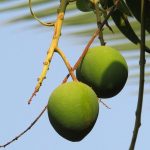As the world grapples with the ever-growing obesity epidemic, researchers are constantly seeking natural and effective weight loss solutions. Among the latest breakthroughs is the discovery of African mango, a fruit native to West Africa that has been traditionally used for centuries to promote health and well-being.
African mango, also known as Irvingia gabonensis, is a large, seed-filled fruit that grows on evergreen trees. It is rich in essential nutrients, including fiber, vitamins, and minerals. However, it is the fruit's unique compounds, known as polyphenols, that have garnered significant attention in the scientific community.
**Weight Loss Properties:**
Polyphenols have been found to possess anti-obesity properties. Studies have shown that African mango extract can help reduce body weight, body mass index (BMI), and waist circumference in obese individuals. This is primarily due to its ability to:
* **Suppress appetite:** Polyphenols stimulate the release of hormones that promote a feeling of fullness, reducing calorie intake.
* **Increase metabolism:** African mango extract has been shown to increase thermogenesis, the production of heat in the body, which boosts calorie expenditure.
* **Reduce fat storage:** Polyphenols may inhibit the formation of new fat cells and promote the breakdown of existing fat.
**Health Benefits Beyond Weight Loss:**
In addition to its weight loss benefits, African mango has also been linked to other health benefits, including:
* **Improved cholesterol levels:** African mango extract has been shown to lower LDL ("bad") cholesterol levels and increase HDL ("good") cholesterol levels.
* **Reduced inflammation:** Polyphenols possess anti-inflammatory properties, which may help protect against conditions like heart disease, cancer, and arthritis.
* **Boosted immune system:** African mango is rich in antioxidants, which help strengthen the immune system and protect against infections.
* **Improved cognitive function:** Some studies have suggested that African mango extract may improve memory and cognitive skills.
**How to Use African Mango:**
African mango is available in various forms, including:
* **Fruit:** The fruit can be eaten fresh, but the seeds are usually discarded.
* **Extract:** African mango extract is available in capsule or powder form.
* **Supplement:** Supplements typically contain a standardized amount of African mango extract.
The recommended dosage of African mango varies depending on the form and purpose of use. It is important to consult with a healthcare professional before taking African mango supplements, as they may interact with certain medications or health conditions.
**Side Effects and Precautions:**
African mango is generally considered safe, but some side effects may occur, such as:
* **Digestive issues:** African mango can cause stomach upset in some individuals.
* **Headaches:** Headaches have been reported in some cases.
* **Skin rashes:** Allergic reactions may occur in rare cases.
Pregnant or breastfeeding women and individuals with liver or kidney disease should avoid taking African mango without consulting a healthcare professional.
**Conclusion:**
African mango is a promising natural supplement for weight loss and overall health. Its unique polyphenols offer a range of benefits, including suppressing appetite, increasing metabolism, and reducing fat storage. It also has potential health benefits for cholesterol, inflammation, immunity, and cognitive function. While more research is needed to fully understand its effects, African mango shows great potential as a safe and effective addition to a healthy lifestyle.

